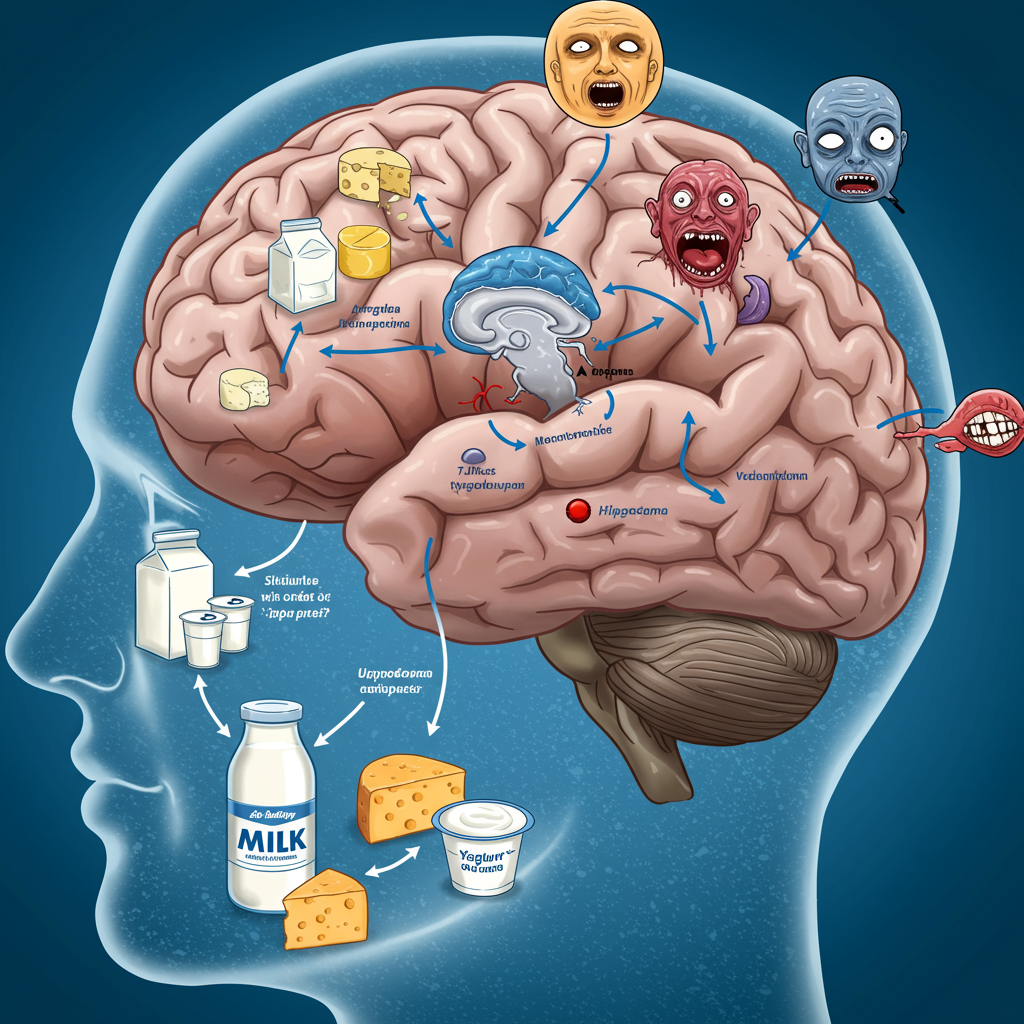Waking up from a terrifying nightmare can leave you shaken, but could your late-night snack be the culprit? Emerging research suggests a surprising connection between what you eat, particularly dairy products, and the quality and content of your dreams. A recent Canadian study dives deep into this link, offering intriguing insights that might change how you view your diet before bed.
Exploring the Diet-Dream Connection
For years, anecdotal evidence has linked certain foods to unusual or disturbing dreams. Spicy meals, sugary treats, and rich foods consumed late in the evening are often blamed for a restless night filled with bizarre or negative dreams. However, scientific investigation into these connections has been limited, relying mostly on individual reports rather than systematic study. This new research aims to bring more data to the conversation.
Conducted by researchers from MacEwan University in Edmonton and led by Dr. Tore Nielsen of Université de Montréal’s Dream and Nightmare Laboratory, the study examined the self-reported eating habits, digestive comfort, and dream experiences of over 1,000 university students. Published in the journal Frontiers in Psychology, the findings suggest that certain dietary factors may indeed play a significant role in shaping our nocturnal narratives.
The Study Unpacked: Gathering the Data
To understand the potential links between diet and dreams, researchers employed a comprehensive questionnaire-based approach. Participants were asked about a wide range of factors, including:
Food sensitivities and allergies, specifically noting conditions like lactose intolerance.
Typical sleep patterns and habits.
How often they recall their dreams.
The general emotional tone of their dreams (positive, negative, or neutral).
Overall health status.
Detailed eating patterns and the perceived healthiness of their diet.
This self-reported data allowed the research team to look for correlations between specific dietary habits, digestive issues, and the characteristics of participants’ dreams and sleep quality.
The Strong Link: Dairy and Nightmares
One of the most striking findings from the study centered on dairy consumption, particularly for individuals with lactose intolerance. Approximately one-third of the students surveyed reported experiencing regular nightmares. Within this group, participants who also reported food sensitivities, especially lactose intolerance, were significantly more likely to describe their sleep as disturbed and their dreams as emotionally intense or distinctly negative.
Dr. Tore Nielsen, the lead author, emphasized the direct association observed. “The severity of lactose intolerance symptoms was associated with the severity of nightmare disorders,” Dr. Nielsen stated. This suggests a potential dose-response relationship where greater difficulty digesting dairy correlates with a higher incidence or intensity of nightmares. The discomfort caused by lactose intolerance – bloating, gas, pain – is known to disrupt sleep, and disrupted sleep, especially during REM stages where most vivid dreams occur, could potentially influence dream content.
Unhealthy Habits and Negative Dreams
Beyond specific sensitivities like lactose intolerance, the study also highlighted a broader connection between generally unhealthy eating habits and negative dreams. Participants whose diets were characterized by frequent fast food consumption, skipping meals, or eating late in the evening were found to experience more negative-toned dreams overall, even if they didn’t meet the criteria for clinical nightmares.
Dr. Nielsen confirmed this association, noting that “Unhealthy eating was, in fact, associated with more nightmares and with more negative dreams in general.” This suggests that poor dietary choices extending beyond single food items could impact dream experiences, possibly through effects on metabolism, blood sugar levels, or general physical discomfort that interferes with restful sleep cycles. The body’s response to processing unhealthy or poorly timed food could create a physiological environment less conducive to peaceful sleep and pleasant dreams.
What Foods Do People Blame?
Interestingly, while the study identified statistical associations, participant perceptions also offered valuable clues. When asked if they believed food directly influenced their dreams, only a small fraction said yes. However, among those who did perceive a link, certain foods were consistently named as culprits.
Desserts topped the list of foods participants blamed for disturbing dreams, followed closely by dairy products and spicy foods. Dr. Nielsen pointed out the significant overlap between the dessert and dairy categories, as many desserts contain dairy ingredients like milk, cream, or butter. This overlap suggests that dairy might be a primary driver behind the perceived negative effects of desserts on dreams for some individuals. Among all the dietary factors participants were asked about, self-reported lactose intolerance emerged as the strongest predictor associated with nightmares. While general food allergies also showed a link, the sample size for this group was too small to draw definitive conclusions.
The Role of Eating Timing
The study also explored the impact of when food is consumed, particularly in the evening. While “night eating” – eating from the fridge without full awareness while partially asleep – was rare among participants, simple evening eating was common. This contributed to participants being classified in the “unhealthy eating” category if combined with other poor habits.
There is existing evidence that eating close to bedtime can affect sleep quality, potentially due to digestive processes interfering with the body’s wind-down period. However, Dr. Nielsen noted that the scientific evidence specifically linking late-night eating to changes in dream content is not as robust as the evidence linking it to general sleep disruption. The study’s findings add another layer to this, suggesting that while late eating is part of an “unhealthy” pattern linked to negative dreams, the strongest nightmare link observed was specifically with dairy sensitivity.
Understanding the Limitations
It is crucial to interpret these findings with an understanding of the study’s limitations. The research relied entirely on self-reported data. Participants provided information about their diet, sleep, and dreams retrospectively, which can be subject to recall bias and inaccuracies. People might unknowingly attribute bad dreams to the last thing they ate simply because it’s a common suspicion.
Furthermore, while the study identified strong associations or correlations between dairy, lactose intolerance, unhealthy eating, and nightmares, it cannot prove causation. This means the study shows these things often occur together, but it doesn’t definitively prove that dairy consumption causes the nightmares. There could be other underlying factors influencing both dietary choices, digestive issues, and dream experiences.
Dr. Nielsen emphasized the necessity of future research to confirm these intriguing findings. “The only way we can really do that is with experimental studies where we have different groups eating different kinds of food before bed or not before bed, and then comparing the groups to see how their dreams change,” he explained. Controlled experiments are needed to isolate specific dietary components and timings to see if they directly impact dream content and sleep quality under controlled conditions.
What This Could Mean For You
While controlled experiments are needed, the study offers valuable insights for individuals experiencing frequent nightmares or poor sleep. If you consume dairy regularly, especially if you suspect or know you have some degree of lactose intolerance, and you also struggle with disturbing dreams, this research suggests a potential area to explore.
It does not mean everyone who eats cheese will have nightmares. However, if you are looking for potential dietary triggers for negative sleep experiences, dairy could be one to consider, particularly if accompanied by digestive discomfort.
Simple steps might include:
Keeping a food and dream journal to track patterns.
Consulting with a healthcare professional or a registered dietitian.
Considering a temporary, monitored reduction or elimination of dairy from your evening diet to see if it impacts your dreams or sleep quality.
Remember, dietary changes should be made thoughtfully and ideally with professional guidance, especially if you have underlying health conditions or nutritional concerns.
Frequently Asked Questions
What did the Canadian study find about dairy and nightmares?
The study, conducted at MacEwan University, found a significant association between consuming dairy, especially among those with self-reported lactose intolerance, and an increased likelihood of experiencing nightmares and poor sleep quality. It used questionnaires with over 1,000 students to explore links between diet, digestive issues, and dreams.
Should people with lactose intolerance avoid dairy to stop nightmares?
The study suggests a strong correlation between the severity of lactose intolerance symptoms and the severity of nightmare problems. While it doesn’t prove dairy causes* nightmares, individuals with lactose intolerance who experience frequent nightmares might consider discussing potential dietary adjustments with a doctor or dietitian, as dairy could be a contributing factor based on this research.
Do other foods cause bad dreams according to the study?
Yes, the study also found that generally unhealthy eating habits, such as frequently eating fast food, skipping meals, or eating late, were associated with more negative-toned dreams overall. Additionally, participants who believed food affected their dreams most often blamed desserts (which often contain dairy), spicy foods, and dairy products.
Conclusion
The MacEwan University study provides compelling, though preliminary, evidence linking dairy consumption and unhealthy eating habits to negative dream experiences and nightmares. While the self-reported nature of the data means we cannot definitively say dairy causes nightmares, the strong association found, particularly for lactose intolerance, highlights a fascinating potential connection between gut health, diet, and the mysterious world of dreams. Future controlled studies are essential to confirm these findings and uncover the precise mechanisms at play. For now, paying attention to how your body (and your dreams) react to certain foods, like dairy, especially before bed, might be a worthwhile step toward achieving sweeter dreams.




